英语里面的委婉语
- 格式:pdf
- 大小:272.44 KB
- 文档页数:8
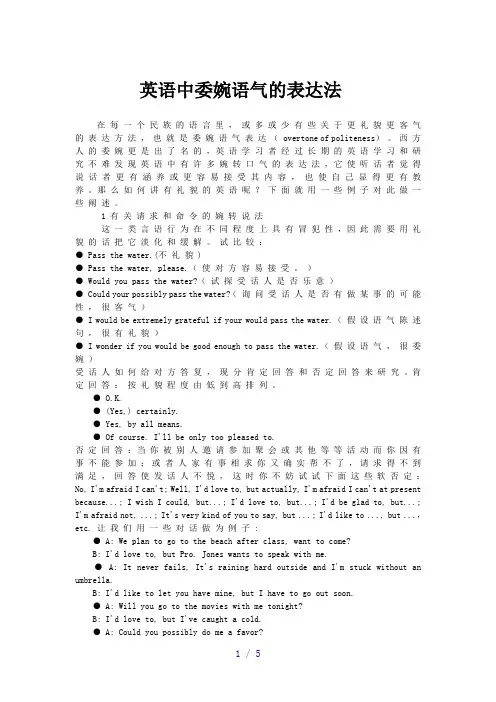
英语中委婉语气的表达法在每一个民族的语言里,或多或少有些关于更礼貌更客气的表达方法,也就是委婉语气表达( overtone of politeness)。
西方人的委婉更是出了名的,英语学习者经过长期的英语学习和研究不难发现英语中有许多婉转口气的表达法,它使听话者觉得说话者更有涵养或更容易接受其内容,也使自己显得更有教养。
那么如何讲有礼貌的英语呢?下面就用一些例子对此做一些阐述。
1 有关请求和命令的婉转说法这一类言语行为在不同程度上具有冒犯性,因此需要用礼貌的话把它淡化和缓解。
试比较:● Pass the water.(不礼貌 )● Pass the water, please.(使对方容易接受。
)● Would you pass the water?(试探受话人是否乐意)● Could your possibly pass the water?(询问受话人是否有做某事的可能性,很客气)● I would be extremely grateful if your would pass the water.(假设语气陈述句,很有礼貌)● I wonder if you would be good enough to pass the water.(假设语气,很委婉)受话人如何给对方答复,现分肯定回答和否定回答来研究。
肯定回答:按礼貌程度由低到高排列。
● O.K.● (Yes,) certainly.● Yes, by all means.● Of course. I'll be only too pleased to.否定回答:当你被别人邀请参加聚会或其他等等活动而你因有事不能参加;或者人家有事相求你又确实帮不了,请求得不到满足,回答使发话人不悦,这时你不妨试试下面这些软否定:No, I'm afraid I can't; Well, I'd love to, but actually, I'm afraid I can't at present because...; I wish I could, but...; I'd love to, but...; I'd be glad to, but...; I'm afraid not, ...; It's very kind of you to say, but ...; I'd like to ..., but ...,etc. 让我们用一些对话做为例子 :● A: We plan to go to the beach after class, want to come?B: I'd love to, but Pro. Jones wants to speak with me.● A: It never fails, It's raining hard outside and I'm stuck without an umbrella.B: I'd like to let you have mine, but I have to go out soon.● A: Will you go to the movies with me tonight?B: I'd love to, but I've caught a cold.● A: Could you possibly do me a favor?B: Sure, What is it?A: I've got a problem. I have to fix my table and I don't have a hammer. Could I possibly borrow yours? B: I'm sorry. I'm afraid I don't have one.A: Oh .Do you know anybody who does?B: Yes. You should call Charlie. I'm sure he'll be happy to lend you his.A: Thank you. I'll call him right away.● A: It's such a fine day, shall we go to the park for a walk?B: I'd like to join you, but I find it chilly to walk outside in spite of the sun.2 劝告的婉转法试比较下面句子(按从直截了当到较有礼貌的含蓄的劝告表达法排列)● You ought to type this paper.(有强加于人的意向 )● You really should slow down at your office.● You'd better tell him the truth.● I'd advise you to take a vacation.● You should take your parents' advice, they know what's best for you.● If I were you , I'd buy another car without hesitation.(含蓄地达到劝告目的)3 建议的表达法试比较:● I suggest you go for some advice.(不够礼貌,用于熟悉的人 )● I would suggest starting the work at once.(较委婉)● You can read the novel now if you like.(给人选择余地,较客气)● You could/might have a look at the novel.(客气)● Why not call me next weekend?(有礼貌的建议)● Why don't you find a decent job?(同 5))● Can /may/Could/might I suggest that...?(使受话人容易接受)● It would be better if you copy that again.(假设条件句,容易使人接受)● I wonder if I might make the suggestion that...(用在正式场合,比如外交家的审慎的辞令风格)4 如何利用某些时态婉转地表达自己种种想法从上面所举例子,我们不难发现英语中有些时态其实并不表示真正的时态,而是与英语中的委婉语气密不可分的,例如:4.1 某些实意动词( want, wonder, think, hope等)的过去时、现在进行时、过去进行时表现在时比直接用现在时态更婉转,如:● A: Did you want me?B: Yes, I wondered if you could give me some help.● It's time you had a holiday.● I wish you lived closer to us.● If only you lent your book to me.● I'm hoping you'll give us some advice.● I'm wondering if I may have a word with you.● I was wondering /wondered if you'd like to come out with me one evening.● I was hoping / hoped you could send me some books.上面所举例子实际上都可以用一般现在时来代替,但是就不如用一般过去时;现在进行时或过去进行时委婉。
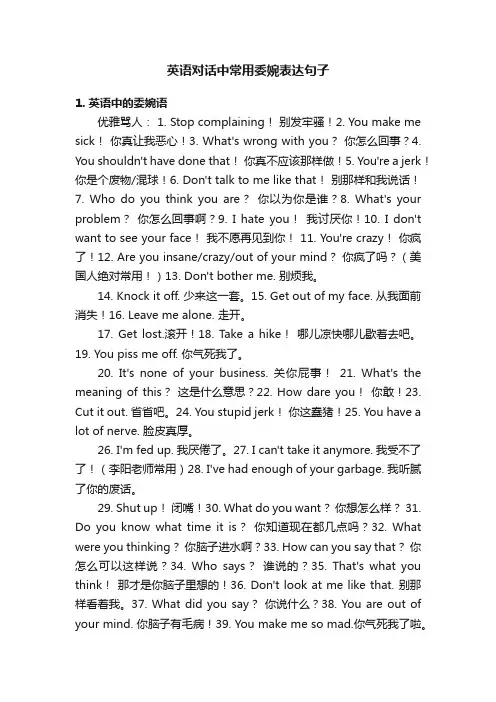
英语对话中常用委婉表达句子1. 英语中的委婉语优雅骂人: 1. Stop complaining!别发牢骚!2. You make me sick!你真让我恶心!3. What's wrong with you?你怎么回事?4. You shouldn't have done that!你真不应该那样做!5. You're a jerk!你是个废物/混球!6. Don't talk to me like that!别那样和我说话!7. Who do you think you are?你以为你是谁?8. What's your problem?你怎么回事啊?9. I hate you!我讨厌你!10. I don't want to see your face!我不愿再见到你! 11. You're crazy!你疯了!12. Are you insane/crazy/out of your mind?你疯了吗?(美国人绝对常用!)13. Don't bother me. 别烦我。
14. Knock it off. 少来这一套。
15. Get out of my face. 从我面前消失!16. Leave me alone. 走开。
17. Get lost.滚开!18. Take a hike!哪儿凉快哪儿歇着去吧。
19. You piss me off. 你气死我了。
20. It's none of your business. 关你屁事!21. What's the meaning of this?这是什么意思?22. How dare you!你敢!23. Cut it out. 省省吧。
24. You stupid jerk!你这蠢猪!25. You have a lot of nerve. 脸皮真厚。
26. I'm fed up. 我厌倦了。
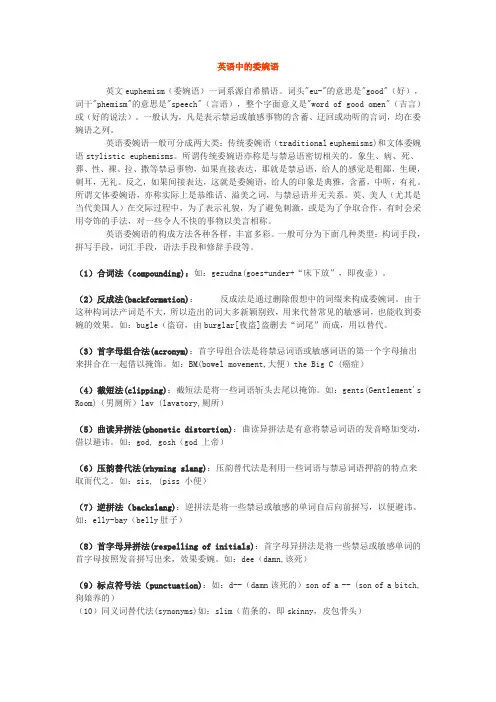
英语中的委婉语英文euphemism(委婉语)一词系源自希腊语。
词头"eu-"的意思是"good"(好),词干"phemism"的意思是"speech"(言语),整个字面意义是"word of good omen"(吉言)或(好的说法)。
一般认为,凡是表示禁忌或敏感事物的含蓄、迂回或动听的言词,均在委婉语之列。
英语委婉语一般可分成两大类:传统委婉语(traditional euphemisms)和文体委婉语stylistic euphemisms。
所谓传统委婉语亦称是与禁忌语密切相关的。
象生、病、死、葬、性、裸、拉、撒等禁忌事物,如果直接表达,那就是禁忌语,给人的感觉是粗鄙,生硬,刺耳,无礼。
反之,如果间接表达,这就是委婉语,给人的印象是典雅,含蓄,中听,有礼。
所谓文体委婉语,亦称实际上是恭维话、溢美之词,与禁忌语并无关系。
英、美人(尤其是当代美国人)在交际过程中,为了表示礼貌,为了避免刺激,或是为了争取合作,有时会采用夸饰的手法,对一些令人不快的事物以美言相称。
英语委婉语的构成方法各种各样,丰富多彩。
一般可分为下面几种类型:构词手段,拼写手段,词汇手段,语法手段和修辞手段等。
(1)合词法(compounding):如:gezudna(goes+under+“床下放”,即夜壶)。
(2)反成法(backformation):反成法是通过删除假想中的词缀来构成委婉词。
由于这种构词法产词是不大,所以造出的词大多新颖别致,用来代替常见的敏感词,也能收到委婉的效果。
如:bugle(盗窃,由burglar[夜盗]盗删去“词尾”而成,用以替代。
(3)首字母组合法(acronym):首字母组合法是将禁忌词语或敏感词语的第一个字母抽出来拼合在一起借以掩饰。
如:BM(bowel movement,大便)the Big C (癌症)(4)截短法(clipping):截短法是将一些词语斩头去尾以掩饰。
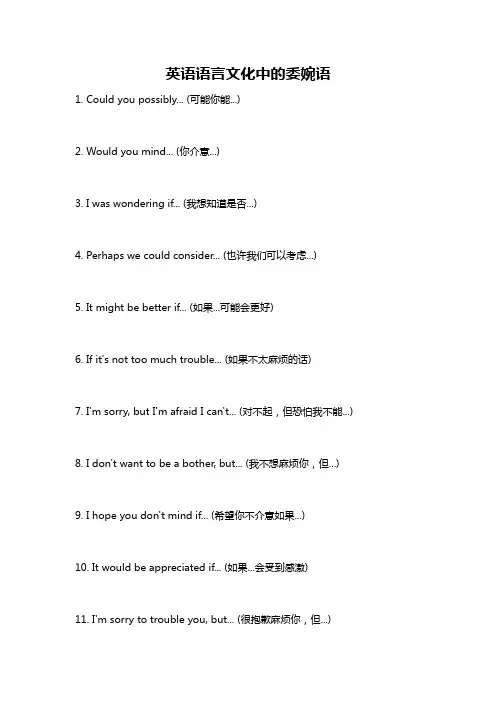
英语语言文化中的委婉语
1. Could you possibly... (可能你能...)
2. Would you mind... (你介意...)
3. I was wondering if... (我想知道是否...)
4. Perhaps we could consider... (也许我们可以考虑...)
5. It might be better if... (如果...可能会更好)
6. If it's not too much trouble... (如果不太麻烦的话)
7. I'm sorry, but I'm afraid I can't... (对不起,但恐怕我不能...)
8. I don't want to be a bother, but... (我不想麻烦你,但...)
9. I hope you don't mind if... (希望你不介意如果...)
10. It would be appreciated if... (如果...会受到感激)
11. I'm sorry to trouble you, but... (很抱歉麻烦你,但...)
12. If it's not too much to ask... (如果不过分的话...)
13. I was wondering whether you could... (我在想你是否能...)
14. Excuse me, but would it be possible to... (请问可否...)
15. I would be grateful if... (如果...我会感激不尽)。
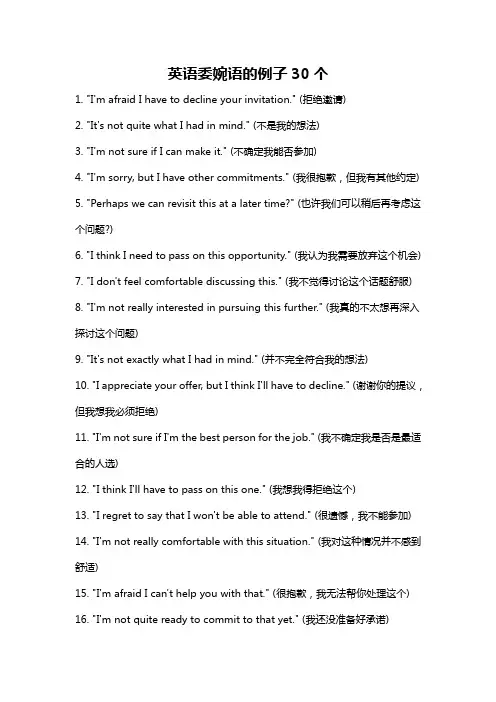
英语委婉语的例子30个1. "I'm afraid I have to decline your invitation." (拒绝邀请)2. "It's not quite what I had in mind." (不是我的想法)3. "I'm not sure if I can make it." (不确定我能否参加)4. "I'm sorry, but I have other commitments." (我很抱歉,但我有其他约定)5. "Perhaps we can revisit this at a later time?" (也许我们可以稍后再考虑这个问题?)6. "I think I need to pass on this opportunity." (我认为我需要放弃这个机会)7. "I don't feel comfortable discussing this." (我不觉得讨论这个话题舒服)8. "I'm not really interested in pursuing this further." (我真的不太想再深入探讨这个问题)9. "It's not exactly what I had in mind." (并不完全符合我的想法)10. "I appreciate your offer, but I think I'll have to decline." (谢谢你的提议,但我想我必须拒绝)11. "I'm not sure if I'm the best person for the job." (我不确定我是否是最适合的人选)12. "I think I'll have to pass on this one." (我想我得拒绝这个)13. "I regret to say that I won't be able to attend." (很遗憾,我不能参加)14. "I'm not really comfortable with this situation." (我对这种情况并不感到舒适)15. "I'm afraid I can't help you with that." (很抱歉,我无法帮你处理这个)16. "I'm not quite ready to commit to that yet." (我还没准备好承诺)17. "I'm not sure that's the best approach." (我不确定那是最好的方法)18. "I don't think this is a good fit for me." (我觉得这不适合我)19. "I'm sorry, I can't make it." (对不起,我不能来)20. "I'd rather not discuss that." (我宁愿不讨论那个)21. "I'm not really looking for a change at the moment." (我现在并不是真的想要改变)22. "I don't think that's a good idea." (我不认为那是个好主意)23. "I'm afraid I have to disagree with you on that." (恐怕我必须在这个问题上与你不同意)24. "I may have to decline this offer." (我可能不得不拒绝这个提议)25. "I'm afraid I can't commit to that right now." (我恐怕现在不能承诺)26. "I'm not really comfortable with the terms." (我不太满意这些条款)27. "I'm afraid I don't have the time for that." (恐怕我没有时间做那个)28. "I don't think that's quite what I had in mind." (我认为那不是我想要的)29. "I'm not really sure what to think about this." (我不是很确定怎么看待这个)30. "I'm afraid I can't provide you with what you're asking for." (恐怕我不能提供你所要求的东西)。
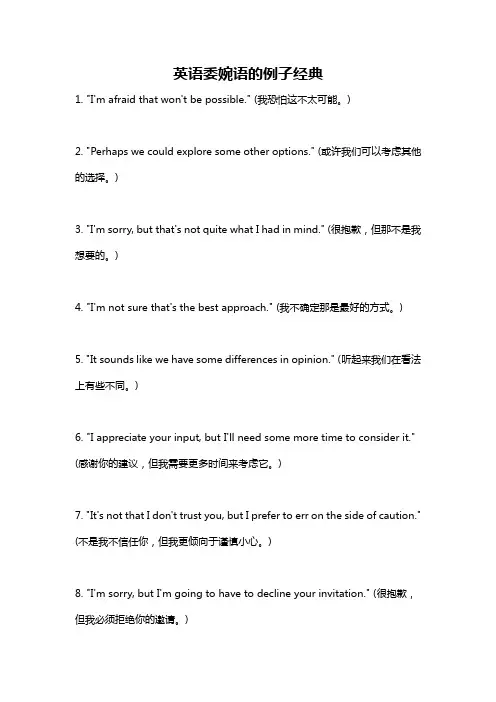
英语委婉语的例子经典1. "I'm afraid that won't be possible." (我恐怕这不太可能。
)2. "Perhaps we could explore some other options." (或许我们可以考虑其他的选择。
)3. "I'm sorry, but that's not quite what I had in mind." (很抱歉,但那不是我想要的。
)4. "I'm not sure that's the best approach." (我不确定那是最好的方式。
)5. "It sounds like we have some differences in opinion." (听起来我们在看法上有些不同。
)6. "I appreciate your input, but I'll need some more time to consider it." (感谢你的建议,但我需要更多时间来考虑它。
)7. "It's not that I don't trust you, but I prefer to err on the side of caution." (不是我不信任你,但我更倾向于谨慎小心。
)8. "I'm sorry, but I'm going to have to decline your invitation." (很抱歉,但我必须拒绝你的邀请。
)9. "I'd love to help, but I'm afraid I'm not available right now." (我很想帮忙,但我恐怕现在没有时间。
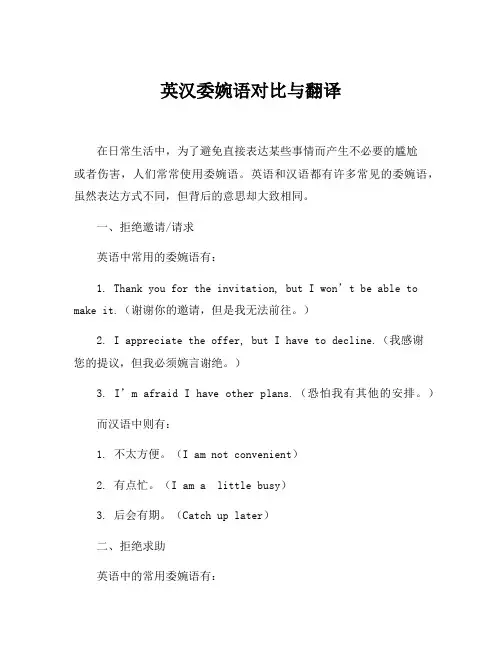
英汉委婉语对比与翻译在日常生活中,为了避免直接表达某些事情而产生不必要的尴尬或者伤害,人们常常使用委婉语。
英语和汉语都有许多常见的委婉语,虽然表达方式不同,但背后的意思却大致相同。
一、拒绝邀请/请求英语中常用的委婉语有:1. Thank you for the invitation, but I won’t be able to make it.(谢谢你的邀请,但是我无法前往。
)2. I appreciate the offer, but I have to decline.(我感谢您的提议,但我必须婉言谢绝。
)3. I’m afraid I have other plans.(恐怕我有其他的安排。
)而汉语中则有:1. 不太方便。
(I am not convenient)2. 有点忙。
(I am a little busy)3. 后会有期。
(Catch up later)二、拒绝求助英语中的常用委婉语有:1. I’d love to help, but unfortunately I’m tied up at the moment.(我很想帮忙,但目前很忙。
)2. I’m sorry, I don’t think I can be of much help in this case.(抱歉,我觉得我对这个事情没有什么帮助。
)3. I appreciate your asking me, but I don’t think I’m the right person to help you.(感谢你向我求助,但我认为我不是合适的人选。
)而汉语中则有:1. 实在抱歉。
(I am really sorry)2. 我没有时间。
(I don't have the time)3. 非常抱歉,我不能帮您。
(I'm terribly sorry, I cannot help you.)三、让对方不要打扰英语中常用的委婉语有:1. I’m sorry, I’m not feeling well, so I need to rest.(抱歉,我不太舒服,需要休息。
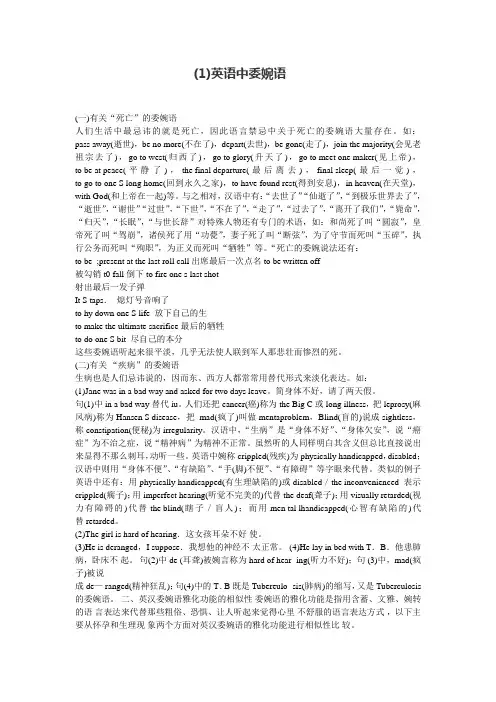
(1)英语中委婉语(一)有关“死亡”的委婉语人们生活中最忌讳的就是死亡,因此语言禁忌中关于死亡的委婉语大量存在。
如:pass away(逝世),be no more(不在了),depart(去世),be gone(走了),join the majority(会见老祖宗去了),go to west(归西了),go to glory(升天了),go to meet one maker(见上帝),to be at peace(平静了),the final departure(最后离去),final sleep(最后一觉),to go to one S long home(回到永久之家),to have found rest(得到安息),in heaven(在天堂),with God(和上帝在一起)等。
与之相对,汉语中有:“去世了”“仙逝了”,“到极乐世界去了”,“逝世”,“谢世”“过世”,“下世”,“不在了”,“走了”,“过去了”,“离开了我们”,“毙命”,“归天”,“长眠”,“与世长辞”对特殊人物还有专门的术语,如:和尚死了叫“圆寂”,皇帝死了叫“驾崩”,诸侯死了用“功甍”,妻子死了叫“断弦”,为了守节而死叫“玉碎”,执行公务而死叫“殉职”,为正义而死叫“牺牲”等。
“死亡的委婉说法还有:to be ;present at the last roll call 出席最后一次点名to be written off被勾销 t0 fall 倒下 to fire one s last shot射出最后一发子弹It S taps.熄灯号音响了to hy down one S life 放下自己的生to make the ultimate sacrifice最后的牺牲to do one S bit 尽自己的本分这些委婉语听起来很平淡,几乎无法使人联到军人那悲壮而惨烈的死。
(二)有关“疾病”的委婉语生病也是人们忌讳说的,因而东、西方人都常常用替代形式来淡化表达。
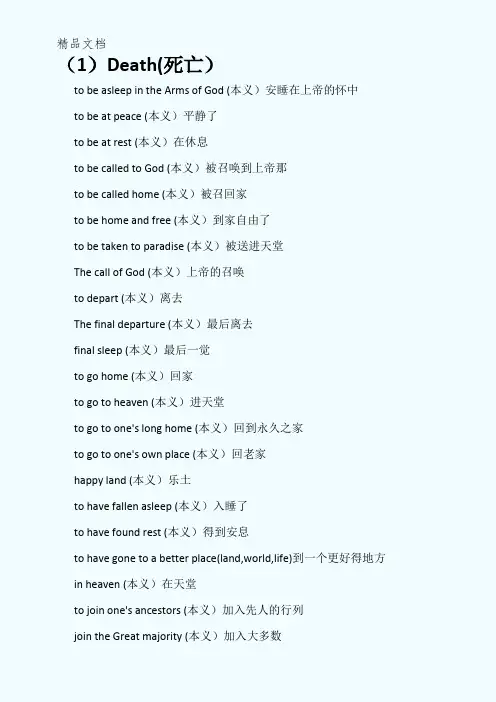
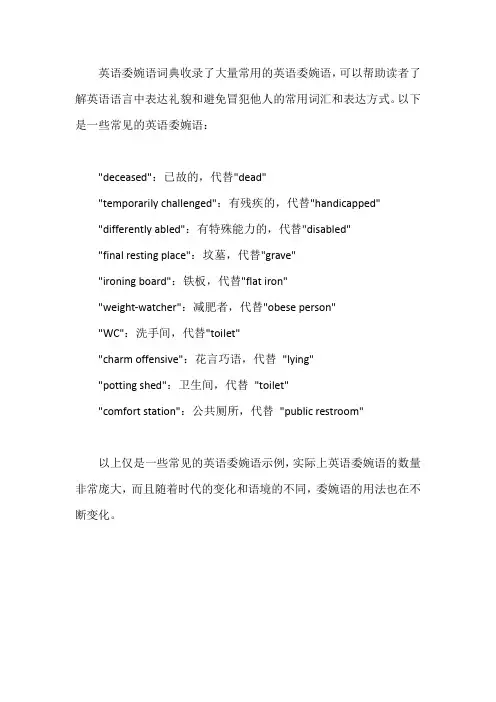
英语委婉语词典收录了大量常用的英语委婉语,可以帮助读者了解英语语言中表达礼貌和避免冒犯他人的常用词汇和表达方式。
以下是一些常见的英语委婉语:
"deceased":已故的,代替"dead"
"temporarily challenged":有残疾的,代替"handicapped"
"differently abled":有特殊能力的,代替"disabled"
"final resting place":坟墓,代替"grave"
"ironing board":铁板,代替"flat iron"
"weight-watcher":减肥者,代替"obese person"
"WC":洗手间,代替"toilet"
"charm offensive":花言巧语,代替"lying"
"potting shed":卫生间,代替"toilet"
"comfort station":公共厕所,代替"public restroom"
以上仅是一些常见的英语委婉语示例,实际上英语委婉语的数量非常庞大,而且随着时代的变化和语境的不同,委婉语的用法也在不断变化。
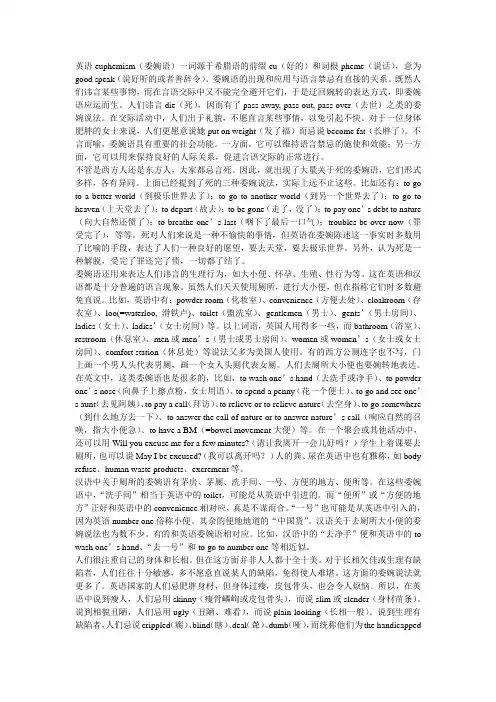
英语euphemism(委婉语)一词源于希腊语的前缀eu(好的)和词根pheme(说话),意为good speak(说好听的或者善辞令)。
委婉语的出现和应用与语言禁忌有直接的关系。
既然人们讳言某些事物,而在言语交际中又不能完全避开它们,于是迂回婉转的表达方式,即委婉语应运而生。
人们讳言die(死),因而有了pass away, pass out, pass over(去世)之类的委婉说法。
在交际活动中,人们出于礼貌,不愿直言某些事情,以免引起不快。
对于一位身体肥胖的女士来说,人们更愿意说她put on weight(发了福)而忌说become fat(长胖了)。
不言而喻,委婉语具有重要的社会功能。
一方面,它可以维持语言禁忌的施使和效能;另一方面,它可以用来保持良好的人际关系,促进言语交际的正常进行。
不管是西方人还是东方人,大家都忌言死。
因此,就出现了大量关于死的委婉语,它们形式多样,各有异同。
上面已经提到了死的三种委婉说法,实际上远不止这些。
比如还有:to go to a better world(到极乐世界去了);to go to another world(到另一个世界去了);to go to heaven(上天堂去了);to depart(故去);to be gone(走了,没了);to pay one’s debt to nature (向大自然还债了);to breathe one’s last(咽下了最后一口气);troubles be over now(罪受完了),等等。
死对人们来说是一种不愉快的事情,但英语在委婉陈述这一事实时多数用了比喻的手段,表达了人们一种良好的愿望,要去天堂,要去极乐世界。
另外,认为死是一种解脱,受完了罪还完了债,一切都了结了。
委婉语还用来表达人们讳言的生理行为,如大小便、怀孕、生殖、性行为等。
这在英语和汉语都是十分普遍的语言现象。
虽然人们天天使用厕所,进行大小便,但在指称它们时多数避免直说。
例1“死亡”的委婉语在英语里,表达“死”的委婉语很多,最常用的有:pass away(过世)、to go west(归西天)、tick the bucket(翘辫子)、turn up one’s toes (伸脚趾)、to go to sleep(长眠)、to be no more(没了,不在了)、to close one’s eyes(闭眼)、to lay down one’s life(牺牲)、to expire(逝世)、to breathe one’s last(咽气)、to end one’s day(寿终)、to pay the debt of nature(了结尘缘)、to cross over to the other side(去世)、to go to the happy hunting ground(去世)等。
例2“贫穷”的委婉语汉语中有“拮据”、“手头紧”、“囊中羞涩”表示贫困,英语中表示“贫穷”的委婉语有:“badly off(短缺的)、less well off(不太宽裕的)、indigent(缺少钱物的)、down on one’s luck(时运不济)、hard up for money(缺钱)、in difficulty(处于困境)。
而have-nots(不富有的人)或a man of modest means(财产不多的人)或negative saver(积蓄为负值的人)都是“穷人”的婉称。
美国对收入低于生活标准的个人或家庭的补助也被称作“税”,即“逆所得税”(negative income tax)。
贫穷落后的发展中国家可说成developing countries或the third world(第三世界)。
例3“老”的委婉语年龄是西方国家的一个敏感话题,可用多种委婉形式表达“老”,如:senior citizen,people in advanced years, elderly people, third age, tofeel one’s age, mature等。
1."I'm afraid I can't make it."(恐怕我不能来):表示拒
绝邀请或请求。
2."It's not quite what I had in mind."(不完全符合我的
想法):表示不满意,但避免直接批评。
3."I'm not sure if I agree."(我不确定是否同意):表达
保留意见或不同意见。
4."Could you please try to be more punctual?"(你能否尽
量准时一点?):委婉地提醒对方要守时。
5."I appreciate your effort,but there is still room for
improvement."(我欣赏你的努力,但还有改进的空间):给予积极的反馈,同时指出可以改进的地方。
6."Perhaps we could explore other options."(也许我们可
以探索其他选择):建议寻找其他解决方案,而非直接拒绝。
7."I'm sorry,but I don't think I can help with that."
(抱歉,我觉得我无法帮忙):婉转地表示无法提供帮助或支持。
8."That's an interesting point of view."(这是一个有趣
的观点):在面对不同意见时,以友善的方式表示对方的观点引起了兴趣。
英语中的委婉语(总8页)--本页仅作为文档封面,使用时请直接删除即可----内页可以根据需求调整合适字体及大小--英语中的委婉语委婉来自希腊语,eu 是好的意思,phemism 是speech (言语)的意思,整个字面的意思是word of good omen (吉祥)或好的说法。
一般认为,凡是表示禁忌或敏感事物的含蓄、迂回或动听的语言,均属委婉语。
由此可知,委婉语不仅是人们交际的需要,更是言语交际中维系人们社会关系和人际关系的重要手段。
随着社会的进步,人类文明的发展,委婉语始终伴随着整个社会的言语交际过程,且表现出极强的言语交际功能。
由于委婉语在英语中应用比较广泛,所以了解委婉语的交际功能对于我们学好英语、进行有效的跨文化交际有很大帮助。
本文从社会语言学的角度,试图通过具体的语言实例,探究在特定的语言环境下英语委婉语的交际功能。
一、委婉语的“避讳”功能语言禁忌起源于古希腊,古罗马时期人们对神的敬畏。
在人类文明的早期,科学尚不发达,人们对一些自然现象还不能认识和解释,对人的自身也认识不足,常常因感某种神秘力量而内心深怀恐惧,在口头语言表达上为一种不愿言、不敢言,久而久之就成为一种语言的禁忌,但因相互交流的需要,有时又不得不表达出此种意思,于是人们逐渐学会了用避讳的话委婉地表达;委婉语也因而产生,并被广泛应用。
这样,避讳禁忌、消除恐惧便成了委婉语的第一功能。
例如Satan 被称为the good man,the great fellow ,Devil 被称为the Big D 及Lord of the Flies. 人们对“死亡”的恐惧必然导致大量有关“死亡”的委婉语的产生。
讲英语国家的人们和许多其他民族的人民一样,忌讳直接说“死”(to die)字,创造了很多表达“死”的意思的委婉语。
例如,人们常用“去了”(to pass away),“离别了”(to depart),“离开了我们”(to leave us),“睡着了”(to go to sleep),“去天国”(to go to heaven),“心脏停止了跳动”(one’s heart has stopped beating),等词来代替说某人“死了”(to die),因为“死”太神秘、太痛苦、太让人恐怖了。
英汉两种语言中的委婉语
委婉语是指当人们要谈论生活中那些惹人不快、让人尴尬、招人厌恶和令人恐惧的事物时所用的词和短语。
英汉两种语言有的委婉语是相同的,比如“死亡”,汉语用“过世了”,英语说“pass away”;“上厕所”,汉语用“去洗手间”,英语说“go to the washroom”。
但是,不同的用法也很多,不能硬译。
比如,“他有经济问题”,意为“He is corrupted.”或“He has accepted the bribery.”不能硬译为“He has the problem of economy.”。
对于“老”,中国人尊老,对年纪大的人尊称“老人家”,而西方人对“老”总有一种恐惧,于是避免说“老”也成了委婉语。
比如,“老人家,麻烦你让一下!”如果译成“Trouble you, old man! Let me pass!”就是典型的中式英语了。
这种情况在英语中一般就表达为“Excuse me, sir!”所以,我们应该多了解英汉两种语言中的委婉语,才能更好地准确表达意思。
英语交际中,为了使对方能愉快地接受自己得请求、建议、命令、警告等,往往要用委婉语气,尤其在口语中。
现将常见得表达方法荟萃如下:一、用“Will you、、、?”提出请求等(1) Will you (please) lend me some writing paper? 请借给我一些信纸好吗?(2) Won’t you sit down and have some whisky? 要不要坐下来喝点儿威士忌?二、用would开头得句式提出请求1、 Would you (please/kindly)、、、 ?(1) I didn’t quite catch your name、 Would you spell it, please? 我没听清您得名字,请拼一下好吗?(2) Would you kindly drive me home?您能不能开车送我回家?2、 Would it be possible /too much (for me)to、、、?(1) Would it be possible for me to take three days off next month? 我可不可以在下个月请三天假?(2) Would it be too much to ask you to look after my baby for a moment? 您可以帮我瞧一会儿孩子吗?3、 Would you be kind/good enough to /so kind as to、、、?(1) Would you be kind/good enough to meet us at the port? 麻烦您到机场接我们好吗?(2) Would you be so kind as to keep me informed? 请随时告诉我一些情况好吗?4、 Would you mind (my) doing、、、?Would you mind my turning down the volume of the television? 您不介意我把电视声音关小点儿吧?5、 Would you mind if I 、、、?Would you mind if I asked you a question? 我可以问您一个问题吗?三、shall用于第一人称与第三人称,构成疑问句,提出建议或征求对方意见(1) Shall we go to the concert tonight? 我们今晚去听音乐会好吗?(2) Shall she e at once? 要她马上来吗?四、用would, should, could, might表示瞧法、提出建议或忠告等(1) It would seem that something is wrong with the truck、瞧来这部卡车出毛病了。
英语中一些委婉的说法作者:Anonymous在英语中,象生、死、如厕等话题直说很不文雅,这时我们可以用委婉的说法,下面是笔者收集的一些有关这些话题的说法。
1)Being in Love (恋爱)assignation (本义)指定to be gone on (本义)一去不返to be shock up (本义)被震撼的to be taken (本义)被吸引住H2 (本义)hot and heavyto have a crush on (本义)捣碎meeting (本义)会面to set one's cap for (本义)指向某人to set one's sights at (本义)目光落在身上to take a fancy to (本义)喜欢上to walk out 出去溜达to cut one's eye at (本义)瞥一眼the glad eye (本义)高兴的眼光to look sweet on (本义)to make eyes at (本义)对某人使眼色wandering eye (本义)游荡的眼光2) Pregnancy (怀孕)a hole out in one(本义)一击入洞(高尔夫术语)an accident(本义)事故anticipating(本义)期待的awkward(本义)行动不便to be caught(本义)被捉住to be gone(本义)已过去了to beget(本义)产生break one's ankle(本义)脚骨折了clucky(本义)抱窝的eating for two(本义)吃双份饭expecting(本义)期待的an expectant mother(本义)期待的母亲to fall(本义)倒下了far gone(本义)去日苦多fragrant(本义)香喷喷的full of heir(本义)怀有继承人to have a hump in the front(本义)前身有块隆肉to have one watermelon on the vine(本义)藤上有瓜了to have one on the way (本义)有人要来in a bad shape(本义)身体不佳in a certain condition(本义)身处某种状态in a delicate condition(本义)身体虚弱in a (the) family way(本义)家常打扮in a familiar way(本义)熟悉地in a particular condition(本义)处于特殊状态in an interesting condition(situation, state)(本义)处于有趣状态in trouble(本义)惹上麻烦infanticipating(本义)期望得子irregularity(本义)不规则现象knitting(本义)绒衣to knock up(本义)敲门叫人lady-in-waiting(本义)有所期待的女子to learn all about diaper folding(本义)学叠尿布a mother-to-be(本义)未来的母亲on the nest(本义)在抱窝P.G.(Pregnant)怀孕的preparing the bassinet(本义)准备摇篮rattle shopping(本义)采购玩具rehearing lullabies(本义)练唱催眠曲to spoil a woman's shape(本义)坏了女子体型to sprain an ankle(本义)扭伤脚踝to swallow a watermelon seed(本义)吞了棵西瓜子that way(本义)那样waiting for the patter of little feet(本义)等呆小脚牙声to wear the apron high(本义)围裙系高a waiting woman(本义)等呆中的妇女with a baby window(本义)有个凸窗肚with child(本义)怀孩子了3)Defcation (如厕)to be caught short (本义)给了个冷不妨the call of nature (本义)自然的需要Can I add some powder? (本义)我可以搽点粉吗?to cash(write) a check (本义)兑(开)张支票to do a job for oneself (本义)做点私事do one's business (本义)干自己的活to do one's duty (本义)尽职to ease oneself (本义)自我轻松一下to eliminate (本义)逐出evacuation (本义)排空to excrete (本义)排泄to find a haven of rest (本义)寻找安息所to fix one's face (本义)化装to freshen up (本义)梳洗打扮to get some fresh air (本义)去呼吸一点新鲜空气to give oneself ease (本义)使自己舒服一下to go (本义)to go into retreat (本义)去僻静to go somewhere (本义)出去一下to go to Egypt (本义)到埃及去to go to one's private office (本义)到私人办公室去to go to bathroom (本义)到洗澡间May I adjourn? (本义)我可以变换一下地方吗?May I please be excused? (本义)失陪了natural necessity (本义)自然的需要nature stop (本义)自然需要停车to pluck a rose (本义)摘朵玫瑰powder one's nose (本义)搽点粉to relieve oneself (本义)轻松一下to wash one's hands (本义)洗洗手4)Death(死亡)to be asleep in the Arms of God (本义)安睡在上帝的怀中to be at peace (本义)平静了to be at rest (本义)在休息to be called to God (本义)被召唤到上帝那to be called home (本义)被召回家to be home and free (本义)到家自由了to be taken to paradise (本义)被送进天堂The call of God (本义)上帝的召唤to depart (本义)离去The final departure (本义)最后离去final sleep (本义)最后一觉to go home (本义)回家to go to heaven (本义)进天堂to go to one's long home (本义)回到永久之家to go to one's own place (本义)回老家happy land (本义)乐土to have fallen asleep (本义)入睡了to have found rest (本义)得到安息to have gone to a better place(land,world,life)到一个更好得地方去了in heaven (本义)在天堂to join one's ancestors (本义)加入先人的行列join the Great majority (本义)加入大多数to leave this world (本义)离开今世to pay one's fee (本义)付费to rest (本义)休息to rest in peace (本义)安息to return to dust (本义)归之尘土to sleep (本义)长眠with God (本义)和上帝在一起with their Father (本义)与圣父在一起to fall (本义)倒下了to do one's bit (本义)尽职了to lay down one's life (本义)放下自己的生命to be no longer with us (本义)不再与我们在一起了to be out of pain (本义)摆脱痛苦to breathe one's last (本义)呼了最后一口气to cancel one's account (本义)销帐pay one's last debt (本义)付最后一笔债to fade away (本义)消失to make one's exit (本义)退场to kick off (本义)开球to be free (本义)解脱了to be gone (本义)去了to be no more (本义)不复存在to close one's eyes (本义)瞑目to come to an end (本义)结束to go beyond (本义)到远方去to expire (本义)呼气to go off (本义)离去to go one's last (本义)走到自己的终点to go one's place (本义)回老家to go to one's resting place (本义)到休息地去to go to west (本义)西去to kick the bucket (本义)踢翻水桶to lose one's life (本义)失去了生命to pass away (本义)离去to stop living (本义)停止生存to take one's rest (本义)休息to shut up the shop (本义)关门英文euphemism(委婉语)一词系源自希腊语。
厕所 bathroom身体机能是文雅人士需避免的话题。
(Bodily functions are "taboo" in polite company.)▌restroom▷Can I use the restroom?我可以用下洗手间吗?▷Where can I wash my hands?哪儿有洗手间?▌public conveniences▷Are there any public conveniences nearby?附近可有公共卫生间?▌ladies / gents▷The ladies and gents are down the corridor on your right.女士和男士卫生间就在你右手边的走廊里。
还有一些幽默表达:▌the smallest room of the house房子里最小的一间屋,这种诙谐说法于20世纪30年代出现在英文里,现在已经有些过时,较少被使用。
▷I'd like to pay a visit to the smallest room of the house.我要去参观一下厕所。
▌powder my nose女士用补妆来委婉表达上厕所,当然爱开玩笑的男士也可以这么说。
▷Where can I powder my nose?我上哪儿能补个粉?▌see a man about a dog这种说法原始意思是指为赛马或者赛狗下注,后来通常作为离开或缺席的借口。
原因通常是去上厕所,或者买酒。
▷He's gone to see a man about a dog.他去方便了。
失业unemployment▌between jobs在前一个和后一个工作之间,也就是待业啦。
▷Interviewer: Tell me about your current position.面试官:请告诉我你目前的职位。
▷Job candidate: I'm between jobs right now.求职者:我目前暂时待业。
▌a resting actor这种说法多指演员。
▷Harry's a resting actor.哈利是个待业演员。
怀孕pregnancy▌expect即期待婴儿出生。
▷His wife is expecting.他妻子怀孕了。
▷She is expecting in March.她预产期是三月。
▌have a bun in the oven烤箱里有面包了。
英式英语,诙谐用法。
▷Have you heard that Katy has a bun in the oven?你听说没,Katy有啦?▌in the family way这是比较老式的说法(old-fashioned)。
▷Have you heard that Jean's in the family way?你听说没,Jean怀上啦?▷They plan to get married now that he's put her in the family way.他弄大了她的肚子,俩人只好结婚。
喝醉drunk▌tired and emotional这是一种较为礼貌和幽默的方式表示某人喝醉了。
▷You must excuse me, I'm a bit tired and emotional just now. I think I'd best be going home.请原谅我,我眼下醉意朦胧,最好还是回家吧。
▌have a bit too much to drink也就是喝多了。
▷He had a bit too much to drink last night.他昨晚喝多了。
▌to be a bit worse for wearThe worse for wear是指衣服穿久,破烂不堪的样子。
如果某人喝太多,走路东倒西歪,形象全无,那么你就可以用这个表达来形容他醉的程度。
▷The three came stumbling in, the worse for wear again.这三人跌跌撞撞进门,又是烂醉如泥的。
▷John looked a bit worse for wear as he got home.约翰到家的时候看起来醉得一塌糊涂。
撒谎lying▌economical with the truth很少提供实情的,谎话连篇的。
▷I discovered that my boss had been economical with the truth when she said t hat the company was making money.我发现老板说公司盈利其实隐瞒了真相。
争吵 arguments▌full and frank discussion表面意思即深入而坦率的探讨,这是一种礼貌的说法,表示争吵或责难(reprimand)。
▷The directors had a full and frank discussion in the meeting.主管们在会上争执不休。
▌have words with someoneWords(注意是复数)有口角、争论(altercation)的意思。
这个表达指可以指吵架,也可以指训斥某人。
▷Elaine had words with Tony over his driving habits.伊莲和托尼因为后者的开车习惯问题而吵起来。
▷If Pete keeps on pushing Billy I'm going to have words with him.如果皮特老这样逼比利,我可要好好找他谈谈了。
穷being poor▌be disadvantagedDisadvantaged,即处境不利的,生活条件差的、经济地位低下的……The government is introducing new schemes to help the disadvantaged.政府引入了新计划,帮助条件差的人群。
▌financially embarrassed经济拮据、财产情况窘迫的▷ I'm afraid I can't come to the restaurant with you. I'm financially embarrassed at the moment.抱歉我不能和你去下馆子了,我目前手头拮据。
死亡death▌pass away 过世这是很常见的代替die这个词的表达,带有哀悼和尊敬的意味。
▷Her uncle passed away last year.她叔叔去年过世了。
▌lost his/her battle 被病魔打败一般指人和病魔抗争,最终没能战胜病魔而死去。
▷My brother lost his battle with lung cancer years ago.我哥哥几年前在和肺癌的抗争中去世。
▌meet one's Maker 去见造物主这是稍微诙谐一点的说法,注意这个Maker要大写,有造物主的意思,所以去见造物主了就是灵魂回归了,就像我们会说某人“去见马克思了”。
▷He knew that he came into the world with nothing and that he would go to meet his Maker with empty hands.他知道自己一无所有来到世上,也将会两手空空离开人间。
▷He's gone to meet his Maker.他去见造物主了。
▌six feet under 六尺之下这是指人死后被埋在六尺黄土之下,也不是特别严肃的说法。
▷I won't worry about money when I'm six feet under.我入土了以后,也就不用再为钱财劳心了。
▌pushing up daisies 坟头长草这种说法的意思是,人被埋入地下后,坟墓上会长出野花来。
通常用在将来时中,不是严肃的用法。
▷I'll be pushing up daisies before this problem is solved.等这问题解决了,我差不多也该告别人世了。
▷If you talk to me like that again, you'll be pushing up the daisies.你要再敢这么跟我说话,你就死定了。
▌in one's box 进棺材非正式说法,俚语。
▷When I'm in my box you can argue all you like about the inheritance.等我进了棺材,你再去争遗产吧,想怎么争怎么争。
宠物安乐死 Animal euthanasia宠物也是家庭成员,如果养的宠物正遭受病痛折磨,很多主人会考虑让它们解脱痛苦(put it out of its misery),也就是animal euthanasia(安乐死)。
▌put down▷We had to put our cat down as she was very ill.我们不得不让我们的猫安乐死,她已经病入膏肓了。
▌put an end to its suffering▷We put an end to her suffering.我们让她解脱病痛了。
外貌年龄高矮胖瘦和年龄也是人们的敏感点,fat、thin、old这种词当面最好还是不要说,太容易冒犯人(cause offense)。
下面给出一些机智的替代词(alternatives),注意在使用的时候,最好再加上些缓和语气的修饰词,比如"a bit"或"a little" 。
▌Alternatives to "fat" 胖还能怎么说▷overweight; heavy 体重偏重▷plump [plʌmp] 丰满▷a bit chubby 圆乎乎的,chubby ['tʃʌbi] 尤其多用于形容小朋友▷curvy ['kə:vi]; curvaceous [kə:'veiʃəs] (指女性)曲线丰满▷statuesque [,stætju'esk] 高大结实▷well-built / a big man (指男性)结实、高大▌Alternatives to "thin" 瘦还能怎么说▷slim; slender 苗条纤细▷petite 娇小,尤指女性▷wiry ['waiəri] 瘦而结实(一点脂肪都没有)▌Alternatives to "old" 老还能怎么说▷a pensioner ['penʃ(ə)nə] 领养老金者,退休老人▷elderly 长者▷a senior citizen 年长公民▷middle-aged 中年人。